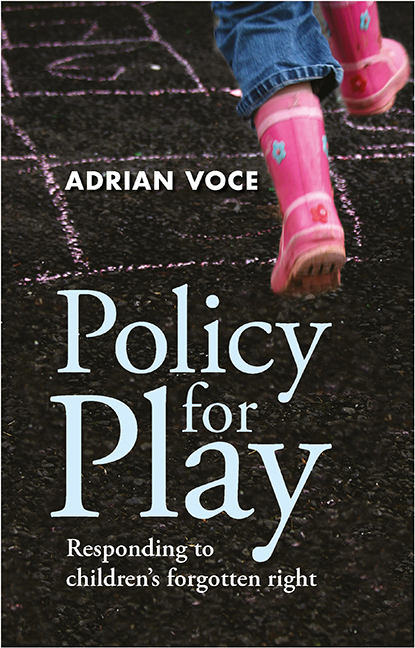Book contents
- Frontmatter
- Dedication
- Contents
- Who’s who
- About the author
- Preface
- Foreword
- Prologue
- Introduction ‘To respect, protect and fulfil’
- one ‘To play and to dream’ • Restoring play to the heart of the campaign for children’s rights
- two ‘For a change’ • Finding the evidence for play policy
- three ‘Advocates for play’ • Playwork’s place at the heart of the play movement
- four ‘New opportunities’ • Lottery funding and the beginnings of public play policy
- five ‘A vital and vibrant city’ • How devolved government in London set a benchmark for play policy
- six ‘Making the case’ • The call for a national play strategy
- seven ‘Things to do, places to go?’ • How play was overlooked by children’s services reform
- eight ‘Getting serious’ • The national play review
- nine ‘Lottery millions’ • The Children’s Play Initiative
- ten ‘Dirt is good’ • The Play England project
- eleven ‘The best place in the world’ • The Play Strategy for England
- twelve ‘Playbuilders’ • Breaking the mould of the public playground
- thirteen ‘Everyday adventures?’ • Austerity brings an end to play policy in England
- fourteen ‘Skylarks and canaries’ • The legacy of the Play Strategy
- fifteen ‘Children now’ • Responding to children’s right to play: conclusions and recommendations
- Epilogue
- References
- Index
ten - ‘Dirt is good’ • The Play England project
Published online by Cambridge University Press: 08 March 2022
- Frontmatter
- Dedication
- Contents
- Who’s who
- About the author
- Preface
- Foreword
- Prologue
- Introduction ‘To respect, protect and fulfil’
- one ‘To play and to dream’ • Restoring play to the heart of the campaign for children’s rights
- two ‘For a change’ • Finding the evidence for play policy
- three ‘Advocates for play’ • Playwork’s place at the heart of the play movement
- four ‘New opportunities’ • Lottery funding and the beginnings of public play policy
- five ‘A vital and vibrant city’ • How devolved government in London set a benchmark for play policy
- six ‘Making the case’ • The call for a national play strategy
- seven ‘Things to do, places to go?’ • How play was overlooked by children’s services reform
- eight ‘Getting serious’ • The national play review
- nine ‘Lottery millions’ • The Children’s Play Initiative
- ten ‘Dirt is good’ • The Play England project
- eleven ‘The best place in the world’ • The Play Strategy for England
- twelve ‘Playbuilders’ • Breaking the mould of the public playground
- thirteen ‘Everyday adventures?’ • Austerity brings an end to play policy in England
- fourteen ‘Skylarks and canaries’ • The legacy of the Play Strategy
- fifteen ‘Children now’ • Responding to children’s right to play: conclusions and recommendations
- Epilogue
- References
- Index
Summary
A small robotic figure about the size of a six-year-old child stands silently, without moving, in a darkened, dusty room. After some moments, dimly flickering lights start to appear behind its artificial eyes. Its rectangular, metallic head turns creakily to one side, then the other.
The robot starts to move forward with hesitant, jerky steps – as though nervous, or perhaps rusty. It slowly emerges, blinking, on to the patio of a domestic suburban garden. It stops, dazzled by the sunshine and unsure of the other elements too. It looks around at its leafy surroundings and hesitates again.
It walks towards the garden, even slower than before. As its robotic foot makes contact with the grass it stops suddenly and looks warily skywards. There is a sound of thunder. Raindrops begin to splash off its hard surfaces.
Alarmed, the robot looks down at its automated feet as the earth beneath them softens under the deluge. Except that it’s automated, metallic limbs have now turned to flesh and blood. It is a human boy, now exploring, for the first time, the sensation of mud between his toes.
The boy squeals with delight and performs a spontaneous, muddy dance for no one but himself, before raising his arms skyward, arching his head back to feel the rain on his face, and laughs, long, loudly and without inhibition.
Dirt is good: all children have the right to play.
(TV and cinema commercial to promote Playday 2006)
Whatever the rationale within government thinking that would eventually lead to a serious commitment to children’s play, there can be no question that the campaigning activity of Play England, made possible by some of the Lottery millions awarded to CPC for its key role in the Children’s Play Initiative, had a big influence.
In 2005, the Big Lottery Fund (BIG) was still a new organisation, formed by a forced merger of two other bodies (Shifrin, 2003) with considerable upheaval. The proposal on its desk for a new £200 million funding programme for children’s play would, if adopted, become its first large strategic programme. There was a lot at stake, not just for the play sector. A decision was made early in BIG’s deliberations that, if the play programme was to go ahead, the £200 million pledged by Labour would be divided proportionately between its programme boards for each of the four home nations.
- Type
- Chapter
- Information
- Policy for PlayResponding to Children's Forgotten Right, pp. 99 - 106Publisher: Bristol University PressPrint publication year: 2015



